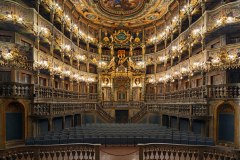Pompeo Magno
September 2025 | ||||||
|---|---|---|---|---|---|---|
Mo | Tu | We | Th | Fr | Sa | Su |
Pompeo Magno
Dramma per musica in three acts by Francesco Cavalli
Text by Nicolò Minato
Margravial Opera House Bayreuth
In Italian with German and English surtitles
Intermissions after Acts I and II
A talk about the production between director Max Emanual Cencic and the dramaturg Dr David Treffinger will take place on 5 and 13 September at 5pm in the Steingraeber Chamber Music Hall, Steingraeberpassage 1. Admission free.
The great military leader Gnaeus Pompeius (Pompeo Magno) has returned victorious to Rome after his third campaign and is given a hero’s welcome by the grandees of the realm and by Caesar himself. But this is not the time to rest on his laurels, for a secret war, this time without the strident alarums of battle, is being fought behind closed doors at the Roman court, waged between love, desire, treachery and jealousy: Sesto, Pompeo’s son, desires the beautiful prisoner of war Issicratea, not realising she is the wife of the supposedly dead Mitridate, an adversary of the great Pompeo. But Mitridate is alive and well, living incognito in Rome, where he tests the faithfulness of his wife and the loyalty of his son Farnace. Pompeo himself is in love with Caesar’s daughter Giulia, who has already promised her heart to Servilio. The feared conqueror must now prove himself as a sensitive human being as well …
Taking centre stage of the Bayreuth Baroque Opera Festival 2025 is the scenic production of Francesco Cavalli’s incandescent opera about confusion and intrigue Pompeo Magno. First performed in 1666 at the Teatro San Salvatore in Venice, the works stands at the apex of the early history of opera, in which all elements shaping the contemporary art of music theatre are consummately interwoven as a densely compact and multifaceted drama. Tragic is juxtaposed to comic, profound emotions interchange with droll grotesquerie. Max Emanual Cenci stages this colourful drama with its rich diversity of characters from the merry and inebriated Carnival season and the commedia dell’arte with scintillating ideas and at a dashing pace. At his side he has a top class ensemble of singers and the Cappella Mediterranea under Leonardo García Alarcón as a team of specialists in the music of the Italian seicento.
Program and cast
Leonardo García Alarcón – Conductor and Harpsichord
Max Emanuel Cencic – Director
Helmut Stürmer – Stage
Corina Gramosteanu – Costumes
Léo Petrequin – Light
Constantina Psoma – Director’s Assistant
Max Emanuel Cencic – Pompeo Magno
Mariana Florès – Issicratea
Valerio Contaldo – Mitridate
Artur Plinta – Amore / Farnace
Nicolò Balducci – Sesto
Sophie Junker – Giulia
Victor Sicard – Cesare
Pierre-Antoine Chaumien – Claudio
Valer Sabadus – Scipione Servilio
Stefan Sbonnik – Crasso
Dominique Visse – Delfo
Kacper Szelążek – Arpalia
Marcel Beekman – Atrea
Cappella Mediterranea* Orchestra in Residence of the Bayreuth Baroque Opera Festival 2025
* Cappella Mediterranea is supported by the Ministry of Culture – DRAC Auvergne Rhône Alpes, the Auvergne-Rhône-Alpes Region, the City of Geneva, a Swiss family foundation, a Geneva private foundation, Brigitte Lescure, and by its Circle of Friends and its Circle of Entrepreneurs with Diot-Siac, Chatillon Architects, Synapsys and 400 Partners.
Cappella Mediterranea is a member of the Fevis (Federation of Specialized Vocal and Instrumental Ensembles) and CNM (National Center of Music).
Margravial Opera House
It was built according to plans designed by the French architect Joseph Saint-Pierre (ca. 1709 – 1754), court builder of the Hohenzollern margrave Frederick of Brandenburg-Bayreuth and his wife Princess Wilhelmine of Prussia. It was inaugurated on the occasion of the marriage of their daughter Elisabeth Fredericka Sophie with Duke Charles Eugene of Württemberg.
The wooden interior was designed by Giuseppe Galli Bibiena (1696 – 1757) and his son Carlo from Bologna in an Italian Late Baroque style. The box theatre is completely preserved in its original condition, except for the curtain which was taken by Napoleon's troops on their march to the 1812 Russian campaign. The prince box was seldom used by the art-minded margravial couple, who preferred a front-row seat.
Princess Wilhelmine, older sister of the Prussian king Frederick the Great, had established the margravial theatre company in 1737. In the new opera house she participated as a composer of opera works and Singspiele, as well as an actor and director. Today she features in a sound-and-light presentation for tourists. After her death in 1758, performances ceased and the building went into disuse, one reason for its good conservation status.
More than one hundred years later, the stage's great depth of 27 metres (89 ft) attracted the composer Richard Wagner, who in 1872 chose Bayreuth as festival centre and had the Festspielhaus built north of the town. The foundation stone ceremony was held on 22 May, Wagner's birthday, and included a performance of Beethoven's Symphony No. 9, directed by the maestro.
Parts of the 1994 biopic Farinelli were filmed in the Opera House. The theatre was the site of the annual Bayreuther Osterfestival until 2009. Each September from the year 2000 to 2009, the theatre also hosted the Bayreuth Baroque festival, with performances of early operatic rarities. The 2009 festival included performances of Andrea Bernasconi's festa teatrale, L'Huomo, to a libretto by the Margravine Wilhelmine.
The theatre closed between October 2012 for extensive refurbishment and redevelopment and reopened 12 April 2018.

 EN
EN DE
DE IT
IT FR
FR ES
ES RU
RU JP
JP RO
RO
 Seating plan
Seating plan 
